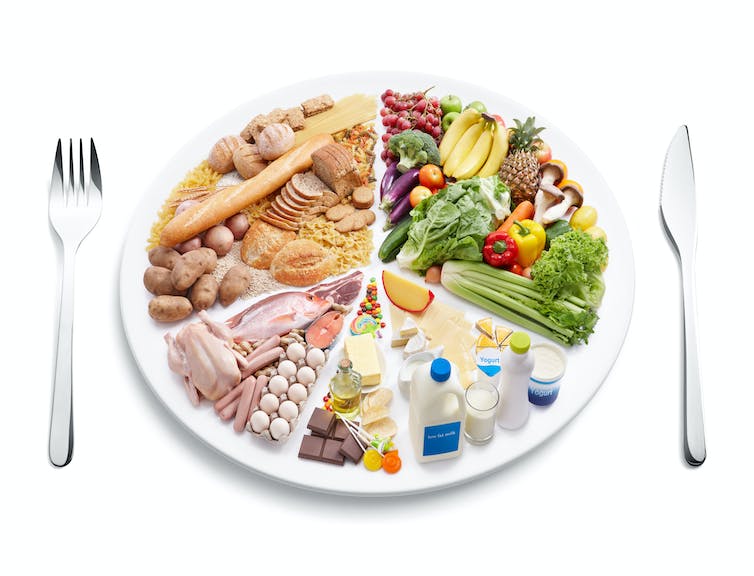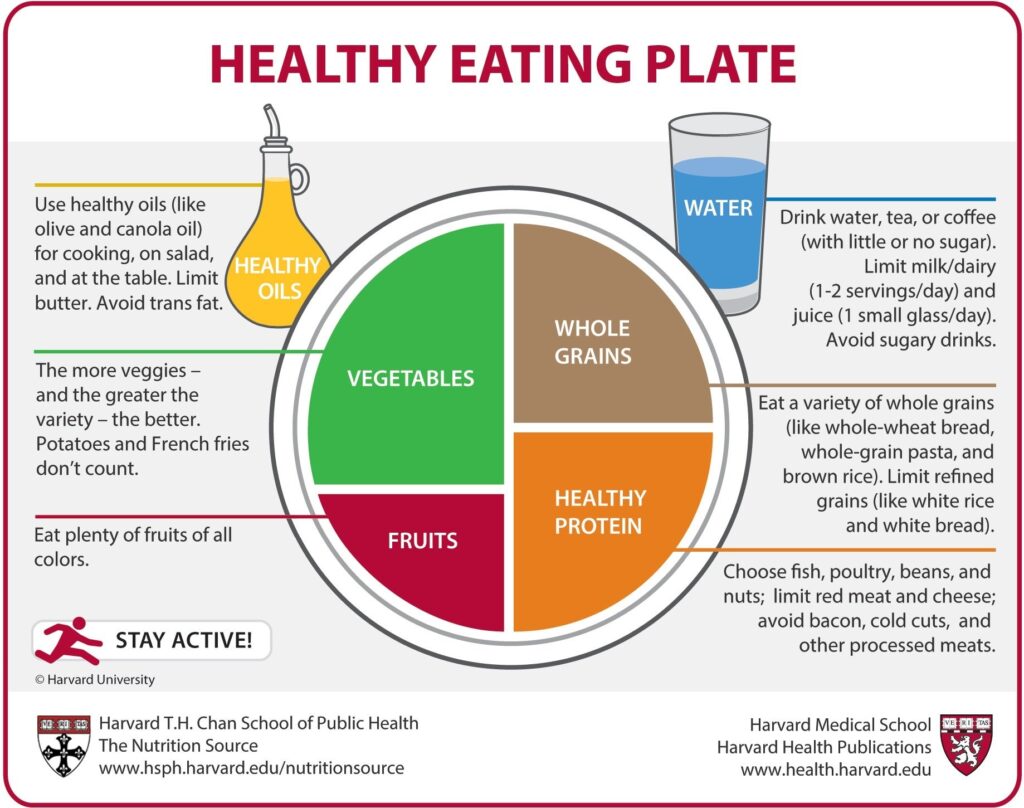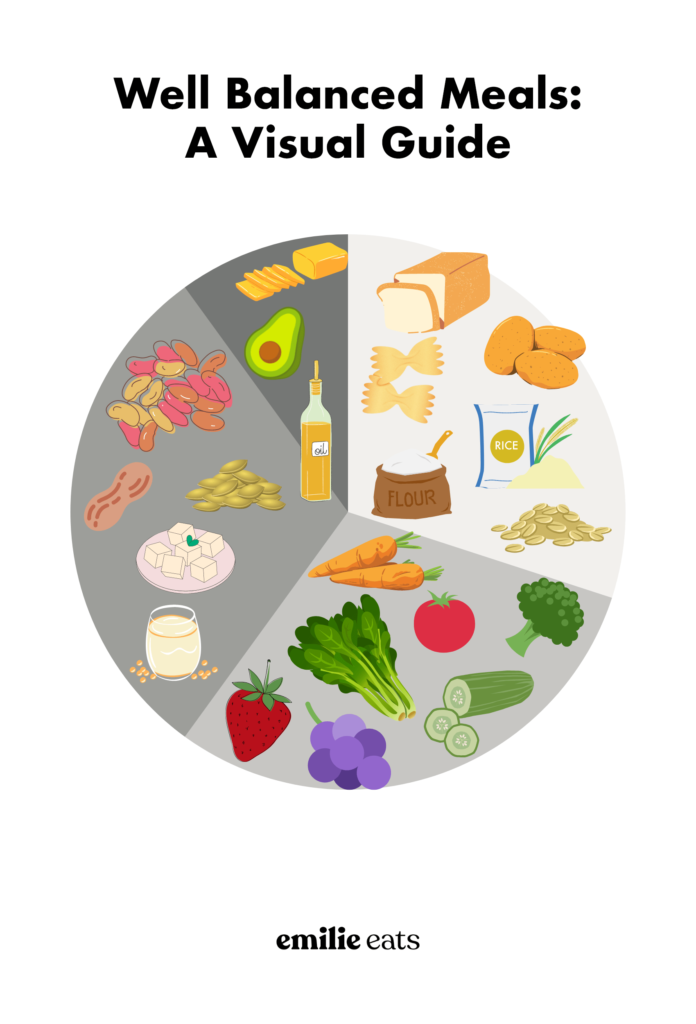I couldn’t help but be amazed by the wonders of a well-rounded diet. It is truly a remarkable experience to explore the vast array of foods that can contribute to our overall health and wellbeing. From vibrant fruits and vegetables to lean proteins and wholesome grains, the possibilities are endless. By embracing a diverse range of foods, we open ourselves up to a world of flavors, textures, and nutritional benefits that can nourish our bodies and invigorate our senses. After all, who wouldn’t want to indulge in a delicious feast while simultaneously fueling their body with the nutrients it craves? With a variety of foods at our disposal, we have the power to create a balanced and fulfilling diet that ensures optimal health and enjoyment.

Benefits of a Well-rounded Diet
In today’s fast-paced world, maintaining a well-rounded diet is more important than ever. A well-rounded diet refers to a meal plan that incorporates a variety of food groups, ensuring that our bodies receive all the essential nutrients they need to function at their best. By focusing on a well-rounded diet, we can enjoy several benefits that positively impact our overall health and well-being.
Improved Nutritional Profile
One of the key benefits of a well-rounded diet is an improved nutritional profile. When we consume a diverse range of foods from different food groups, we provide our bodies with a wide array of essential nutrients such as vitamins, minerals, and antioxidants. These nutrients are crucial for maintaining various bodily functions, including boosting our immune system, supporting brain health, promoting healthy skin, and aiding in digestion. By ensuring that we consume a variety of foods, we can enhance our nutritional intake and support our overall health.
Increased Energy Levels
Another notable benefit of a well-rounded diet is increased energy levels. When we fuel our bodies with a balanced mix of carbohydrates, proteins, and healthy fats, we provide ourselves with the energy needed to power through our day. Carbohydrates are the primary source of energy for our bodies, proteins help build and repair tissues, and healthy fats provide sustained energy. By incorporating a variety of food groups into our diet, we can ensure that our bodies are properly fueled and experience higher energy levels throughout the day.
Reduced Risk of Chronic Diseases
A well-rounded diet can also significantly reduce the risk of chronic diseases. By including a variety of fruits, vegetables, whole grains, lean proteins, and healthy fats in our meals, we provide our bodies with the necessary nutrients and antioxidants to combat inflammation and strengthen our immune system. This, in turn, can help lower the risk of developing various chronic conditions such as heart disease, diabetes, certain cancers, and obesity. By prioritizing a well-rounded diet, we can take proactive measures to safeguard our long-term health and well-being.
Include a Variety of Food Groups
To achieve a well-rounded diet, it is crucial to include a variety of food groups in our meals. Each food group offers different nutrients and benefits, contributing to our overall nutritional intake.
Fruits and Vegetables
Fruits and vegetables are the foundation of a well-rounded diet. These colorful delights are packed with vitamins, minerals, and fiber, making them essential for optimum health. Incorporating a variety of fruits and vegetables into our meals provides us with an abundance of antioxidants that help protect our cells from damage caused by free radicals. Additionally, their high fiber content aids in digestion, promotes satiety, and supports weight management. To maximize the benefits, aim for a variety of colors to ensure a diverse range of nutrients.
Grains and Cereals
Grains and cereals are excellent sources of carbohydrates, essential for providing energy to our bodies. However, not all grains are created equal. Opt for whole grains over refined grains, as they retain more nutrients and fiber. Whole grains like brown rice, oats, and quinoa offer a host of vitamins, minerals, and antioxidants, along with fiber that aids in digestion. Including grains and cereals in our diet provides a filling and satisfying element to our meals while nourishing our bodies with essential nutrients.
Protein Sources
Protein is an essential macronutrient that plays a crucial role in the growth and repair of our body’s tissues. Including a variety of protein sources in our diet is essential for maintaining optimal health. Lean meats, poultry, fish, and seafood are excellent animal-based protein sources that provide essential amino acids and important minerals like iron and zinc. For those following a vegetarian or vegan diet, plant-based proteins such as legumes, soy products, and tofu are great alternatives. Incorporating a diverse range of protein sources ensures that our bodies receive all the necessary amino acids and nutrients they need.
Dairy Products
Dairy products are a valuable source of calcium, which is essential for maintaining strong bones and teeth. They also contain vitamin D, which helps our bodies absorb calcium effectively. Including dairy products like milk, cheese, and yogurt in our diet provides us with these vital nutrients. However, it’s important to note that not everyone can tolerate or consume dairy products due to lactose intolerance or dietary restrictions. Luckily, there are plenty of non-dairy alternatives available, such as fortified plant-based milks and yogurts. These alternatives offer similar nutritional benefits, making them suitable options for those who cannot or choose not to consume dairy.
Healthy Fats and Oils
Contrary to popular belief, not all fats are bad for us. In fact, our bodies need healthy fats for various bodily functions and to absorb certain vitamins. Including healthy fats and oils in our diet is essential for a well-rounded meal plan. Monounsaturated fats found in avocados, olive oil, and nuts help reduce bad cholesterol levels and support heart health. Polyunsaturated fats, found in fatty fish and certain seeds, offer similar benefits and are important for brain health. Omega-3 fatty acids, a type of polyunsaturated fat, are known for their anti-inflammatory properties and are found in abundance in fatty fish like salmon and chia seeds.

Benefits of Eating Fruits and Vegetables
Fruits and vegetables are a crucial part of a well-rounded diet, and the benefits they offer are numerous.
Rich in Vitamins and Minerals
Fruits and vegetables are nature’s multivitamins, brimming with a wide range of essential vitamins and minerals that our bodies need to function optimally. From vitamin C in citrus fruits to vitamin A in carrots, these nutrients play a vital role in maintaining a healthy immune system, promoting good vision, supporting brain function, and much more. By incorporating a variety of fruits and vegetables into our meals, we can ensure that we receive a diverse range of these essential nutrients.
High in Fiber
Fiber is an essential component of a healthy diet, and fruits and vegetables are excellent sources of this dietary fiber. High-fiber foods help regulate digestion, prevent constipation, and promote a feeling of fullness, which can aid in weight management. Additionally, fiber supports the growth of healthy gut bacteria, contributing to overall gut health and a strong immune system. By consuming a variety of fruits and vegetables rich in fiber, we can maintain good digestive health and support overall well-being.
Antioxidant Properties
Fruits and vegetables are packed with antioxidants, which are compounds that help protect our cells from damage caused by harmful molecules called free radicals. Antioxidants can neutralize these free radicals, reducing the risk of chronic diseases and slowing down the aging process. Brightly-colored fruits and vegetables such as berries, tomatoes, and spinach are particularly rich in antioxidants such as vitamin C, vitamin E, and beta-carotene. By including a variety of antioxidant-rich fruits and vegetables in our diet, we can boost our body’s defense against oxidative stress and improve our overall health.
Hydration
Many fruits and vegetables have high water content, making them an excellent source of hydration. Staying hydrated is vital for maintaining several bodily functions, including regulating body temperature, lubricating joints, and promoting healthy skin. By incorporating hydrating fruits and vegetables like watermelon, cucumbers, and oranges into our diet, we can increase our fluid intake and support proper hydration.
Incorporating Grains and Cereals
Grains and cereals play a vital role in a well-rounded diet. They provide essential carbohydrates, fiber, and a host of other nutrients that are instrumental in maintaining good health.
Whole Grains vs. Refined Grains
When it comes to choosing grains, it’s important to prioritize whole grains over refined grains. Whole grains retain all parts of the grain, including the bran, germ, and endosperm, ensuring that they are packed with essential nutrients such as fiber, B vitamins, and minerals. Refined grains, on the other hand, undergo a process that removes the bran and germ, stripping them of much of their nutritional content. Refined grains, such as white rice and white bread, have a higher glycemic index and may contribute to blood sugar imbalances. By choosing whole grains like brown rice, whole wheat bread, and oats, we can provide our bodies with a sustained release of energy and a wealth of nutrients.
Bread, Pasta, and Rice
Bread, pasta, and rice are staple foods in many cultures, and they can also be part of a healthy and well-rounded diet. When selecting these products, opt for whole grain options to ensure that you are receiving the most nutritional benefits. Whole grain bread, whole wheat pasta, and brown rice are excellent choices that provide higher fiber content and a more satisfying meal experience. These whole grain alternatives offer complex carbohydrates that are digested more slowly, providing a steady release of energy and promoting satiety.
Quinoa and Other Ancient Grains
In recent years, there has been a surge in interest in ancient grains, and for good reason. These grains, such as quinoa, farro, and amaranth, have been consumed for centuries and offer a range of nutritional benefits. Quinoa, in particular, is a complete protein, meaning it contains all nine essential amino acids our bodies need. It is also high in fiber, rich in minerals, and gluten-free. By incorporating ancient grains into our meals, we can add variety to our diet while enjoying their unique flavors, textures, and nutritional benefits.

Choosing Protein Sources
Protein is a critical macronutrient that plays a vital role in our overall health. Including a variety of protein sources in our diet ensures that we receive all the essential amino acids and nutrients our bodies need.
Lean Meats and Poultry
Lean meats, such as chicken, turkey, and lean cuts of beef, are excellent sources of protein. They provide essential amino acids, vitamins, and minerals, such as iron and zinc. When choosing meat, it’s important to opt for lean cuts to minimize saturated fat intake. To achieve this, choose skinless poultry and lean cuts of beef, and trim any visible fat. By incorporating lean meats and poultry into our diet, we can enjoy the benefits of high-quality protein while minimizing unhealthy fats.
Fish and Seafood
Fish and seafood offer a wealth of nutritional benefits and are excellent sources of protein. They are also rich in omega-3 fatty acids, which are essential for brain health, heart health, and reducing inflammation in the body. Fatty fish, such as salmon, trout, and sardines, are particularly high in omega-3 fatty acids. Including a variety of fish and seafood in our diet provides us with high-quality protein, beneficial fats, and important minerals like iodine and selenium.
Plant-based Proteins
For those following a vegetarian or vegan diet, or those looking to incorporate more plant-based options into their meals, there are plenty of protein-rich alternatives to choose from. Legumes, such as beans, lentils, and chickpeas, are excellent sources of plant-based protein. They are also rich in fiber, essential minerals, and antioxidants. Soy products, such as tofu and tempeh, are complete protein sources and offer a versatile and delicious option. Other plant-based protein sources include quinoa, nuts, seeds, and certain grains. By incorporating a variety of plant-based proteins into our meals, we can ensure that we meet our nutritional needs while enjoying a diverse range of flavors and textures.
Importance of Dairy Products
Dairy products offer a host of nutritional benefits, particularly when it comes to bone health and providing essential vitamins and minerals.
Calcium and Vitamin D
Dairy products are a significant source of calcium, a mineral that is vital for bone health. Calcium helps build and maintain strong bones and teeth, and it is essential for other bodily functions such as muscle contractions and nerve function. Additionally, many dairy products are also fortified with vitamin D, which helps our bodies absorb calcium more effectively. Adequate calcium and vitamin D intake can help reduce the risk of osteoporosis and support overall bone health.
Alternatives to Dairy
While dairy products can be an excellent source of nutrients for many people, some individuals may be lactose intolerant or have dietary restrictions that prevent them from consuming dairy. Luckily, there are several non-dairy alternatives available that offer similar nutritional benefits. Fortified plant-based milks, such as almond milk, soy milk, and oat milk, are often enriched with calcium, vitamin D, and other essential nutrients. Plant-based yogurts, cheeses, and ice creams made from almond, coconut, or cashew milk are also widely available and provide a suitable alternative for those who cannot or choose not to consume dairy. When choosing these alternatives, be sure to read the labels and select options that are fortified and low in added sugars.

Including Healthy Fats and Oils
Incorporating healthy fats and oils into our diet is essential for maintaining overall health and well-being. Here are some types of healthy fats and oils to consider:
Monounsaturated Fats
Monounsaturated fats are a type of healthy fat found in foods such as avocados, olive oil, almonds, and peanuts. These fats are known to promote heart health by reducing levels of bad cholesterol in the blood. They also provide a good source of vitamin E, which is an antioxidant that helps protect our cells from damage. By incorporating foods rich in monounsaturated fats into our diet, we can support heart health and enjoy their delicious flavors.
Polyunsaturated Fats
Polyunsaturated fats are another type of healthy fat that our bodies need. They are found in foods such as fatty fish, walnuts, flaxseeds, and certain vegetable oils like soybean oil and sunflower oil. These fats are rich in omega-3 and omega-6 fatty acids, which are essential for brain health, heart health, and reducing inflammation in the body. Including polyunsaturated fats in our diet helps support overall health and provides a delicious way to enhance the flavors of our meals.
Omega-3 Fatty Acids
Omega-3 fatty acids are a specific type of polyunsaturated fat that offers unique health benefits. They are mainly found in fatty fish such as salmon, mackerel, and sardines. Omega-3 fatty acids are essential for brain health, as they play a vital role in cognitive function and mood regulation. They also promote heart health by reducing inflammation and supporting proper heart rhythm. For those who do not consume fish, plant-based sources of omega-3 fatty acids include flaxseeds, chia seeds, and walnuts. Including omega-3 fatty acids in our diet supports overall well-being and contributes to a well-rounded meal plan.
Eating in Moderation
While a well-rounded diet is essential for optimal health, it’s equally important to practice moderation when it comes to our food choices. Here are some important aspects to consider:
Portion Control
Portion control plays a significant role in maintaining a healthy diet. It’s important to be mindful of the quantity of food we consume, as overeating can lead to weight gain and other health issues. Practicing portion control involves monitoring serving sizes, using smaller plates, and avoiding large portions of high-calorie foods. By being mindful of portion sizes, we can ensure that we consume an appropriate amount of food and maintain a healthy weight.
Balancing Macronutrients
Another aspect of eating in moderation is ensuring a balance of macronutrients in our meals. Our bodies require carbohydrates, proteins, and fats in specific proportions for optimal functioning. Carbohydrates provide energy, proteins support tissue growth and repair, and fats aid in the absorption of vitamins and minerals. By including a balance of these macronutrients in our meals, we can support overall health and prevent imbalances that can lead to weight gain or nutrient deficiencies.
Treats and Indulgences
In moderation, treats and indulgences can have a place in a well-rounded diet. Allowing ourselves the occasional treat can help satisfy cravings and promote a healthy relationship with food. However, it’s important to be mindful of the frequency and portion sizes of these indulgences. Opting for smaller portion sizes or healthier alternatives can help maintain balance while still enjoying the foods we love. By practicing moderation with treats and indulgences, we can strike a balance between nourishing our bodies and enjoying the occasional indulgence.

Planning Meals and Snacks
Planning meals and snacks is an excellent way to ensure that we stick to a well-rounded diet and make healthy choices throughout the day. Here are some tips for effective meal planning:
Meal Prep
Meal prepping involves preparing meals and snacks in advance, typically on a weekly basis. This practice helps save time, reduce impulse food choices, and ensures that we always have healthy options available. To start meal prepping, choose a day or time during the week to plan and prepare your meals. Create a menu, make a grocery list, and then spend a few hours cooking and portioning out your meals. By having pre-prepared meals readily available, you can make healthier choices and avoid relying on unhealthy convenience foods.
Snack Options
Snacks are an essential part of a well-rounded diet, and planning healthy snack options is crucial for maintaining energy levels and preventing overeating at meals. When planning snacks, opt for nutrient-dense options such as fresh fruits, vegetables with hummus or nut butter, Greek yogurt, or a small handful of nuts and seeds. These snacks provide a balance of macronutrients and help keep hunger at bay between meals. It’s also essential to be mindful of portion sizes when it comes to snacks, as they can easily turn into excessive calorie consumption if not portioned appropriately.
Mindful Eating
In addition to planning meals and snacks, incorporating mindful eating into our daily routine can have significant benefits. Mindful eating involves fully engaging with and savoring our meals, paying attention to our body’s hunger and fullness cues, and being present in the eating experience. By slowing down and focusing on the sensory aspects of eating, we can cultivate a greater appreciation for our food, enhance digestion, and promote healthier eating habits. Practicing mindful eating also helps prevent overeating and allows us to make conscious and satisfying choices.
Experimenting with International Cuisines
Exploring international cuisines is an exciting way to add variety to a well-rounded diet. Here are a few popular cuisines and the benefits they offer:
Mediterranean Diet
The Mediterranean diet is often hailed as one of the healthiest eating patterns in the world. It is abundant in fruits, vegetables, whole grains, legumes, nuts, seeds, olive oil, and fish. This diet is rich in healthy fats, antioxidants, and fiber, and has been associated with reduced risks of heart disease and improved overall health. Incorporating Mediterranean-inspired dishes into our meals can provide a wide range of flavors, textures, and essential nutrients that contribute to a well-rounded diet.
Asian-Inspired Dishes
Asian cuisines, such as Chinese, Japanese, Thai, and Indian, offer a diverse range of flavors and ingredients that can enhance a well-rounded diet. These cuisines often incorporate a variety of vegetables, lean proteins, and beneficial spices and herbs. For example, Japanese cuisine features seafood, seaweed, and fermented foods like miso and soy sauce, providing important minerals and probiotics. Indian cuisine utilizes a rich blend of spices such as turmeric, cumin, and ginger, which offer various health benefits. By experimenting with Asian-inspired dishes, we can broaden our culinary horizons and introduce new and exciting flavors into our meals.
Latin American Flavors
Latin American cuisine is famous for its vibrant flavors and colorful ingredients. Dishes from countries like Mexico, Brazil, and Peru are known for their use of fresh fruits, vegetables, whole grains, beans, and lean proteins like poultry and fish. Latin American cuisine also incorporates a variety of herbs and spices, such as cilantro, cumin, and chili peppers, adding depth and flavor to dishes. Including Latin American flavors in our meals allows us to enjoy nutrient-rich ingredients while adding a touch of spice and excitement to our well-rounded diet.
In conclusion, maintaining a well-rounded diet offers a plethora of benefits that positively impact our overall health and well-being. By incorporating a variety of fruits and vegetables, grains and cereals, protein sources, dairy products, and healthy fats and oils, we can ensure that our bodies receive all the essential nutrients they need. Eating in moderation, planning meals and snacks, and experimenting with international cuisines further enhance the enjoyment and nutritional value of a well-rounded diet. By prioritizing a well-rounded diet, we take a proactive approach to our health, increase our energy levels, and reduce the risk of chronic diseases. So let’s savor the array of flavors and nourishing choices that a well-rounded diet provides, and embrace the journey to a healthier and happier lifestyle.



